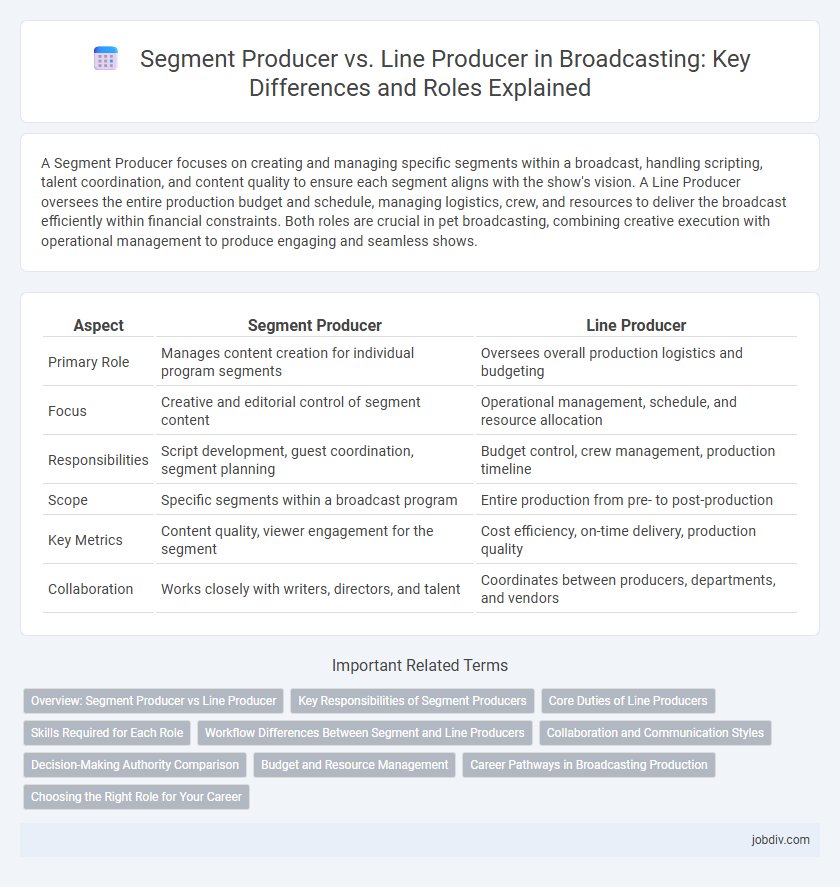A Segment Producer focuses on creating and managing specific segments within a broadcast, handling scripting, talent coordination, and content quality to ensure each segment aligns with the show's vision. A Line Producer oversees the entire production budget and schedule, managing logistics, crew, and resources to deliver the broadcast efficiently within financial constraints. Both roles are crucial in pet broadcasting, combining creative execution with operational management to produce engaging and seamless shows.
Table of Comparison
| Aspect | Segment Producer | Line Producer |
|---|---|---|
| Primary Role | Manages content creation for individual program segments | Oversees overall production logistics and budgeting |
| Focus | Creative and editorial control of segment content | Operational management, schedule, and resource allocation |
| Responsibilities | Script development, guest coordination, segment planning | Budget control, crew management, production timeline |
| Scope | Specific segments within a broadcast program | Entire production from pre- to post-production |
| Key Metrics | Content quality, viewer engagement for the segment | Cost efficiency, on-time delivery, production quality |
| Collaboration | Works closely with writers, directors, and talent | Coordinates between producers, departments, and vendors |
Overview: Segment Producer vs Line Producer
A Segment Producer focuses on creating specific content segments within a broadcast, managing script development, talent coordination, and editorial decisions to ensure engaging and relevant material. In contrast, a Line Producer oversees the overall production logistics, budgeting, scheduling, and resource allocation to maintain smooth operations across all segments. Both roles are essential, with the Segment Producer driving creative content and the Line Producer ensuring practical execution.
Key Responsibilities of Segment Producers
Segment Producers focus on managing the content and creative direction of specific segments within a broadcast, ensuring each segment aligns with the overall show format and target audience. They coordinate with writers, talent, and technical crews to develop scripts, oversee rehearsals, and finalize segment timing for seamless integration into the production schedule. Unlike Line Producers, who handle budget and logistical aspects of entire productions, Segment Producers concentrate on the narrative and artistic quality of individual segments.
Core Duties of Line Producers
Line Producers oversee the daily operations and logistics of a broadcast production, ensuring the project stays on schedule and within budget. They manage crew hiring, coordinate equipment rentals, and supervise on-set activities to maintain efficient workflow. Unlike Segment Producers who focus on content creation for specific segments, Line Producers handle the overall production management and resource allocation.
Skills Required for Each Role
Segment Producers require strong storytelling abilities, scriptwriting skills, and proficiency in content editing software to craft compelling individual segments. Line Producers need expertise in budget management, scheduling, and logistical coordination to ensure the smooth execution of the entire production process. Both roles demand effective communication and problem-solving skills, but Segment Producers prioritize creative vision while Line Producers focus on operational efficiency.
Workflow Differences Between Segment and Line Producers
Segment producers concentrate on individual segments or specific parts of a broadcast, managing content selection, script development, and coordination with on-air talent to ensure each segment aligns with the show's vision. Line producers oversee the entire production workflow, including budgeting, scheduling, and logistics, ensuring that all segments and production elements come together seamlessly within the allocated resources. The workflow difference lies in the segment producer's focus on creative content execution for particular segments, while the line producer manages overall production operations and resource allocation.
Collaboration and Communication Styles
Segment Producers prioritize creative collaboration with directors and talent, focusing on developing content segments that align with the show's vision. Line Producers emphasize clear, concise communication with crew and vendors to manage budgets, schedules, and logistical details efficiently. Effective broadcasting relies on the interplay between Segment Producers' creative input and Line Producers' operational oversight to achieve seamless production.
Decision-Making Authority Comparison
Segment Producers primarily make creative decisions related to content development, scripting, and segment structure, ensuring each part aligns with the overall vision. Line Producers hold broader decision-making authority over budgeting, scheduling, and resource allocation, managing the logistical and financial aspects of the entire production. The distinction lies in Segment Producers focusing on artistic execution while Line Producers control operational elements crucial for timely and cost-effective delivery.
Budget and Resource Management
Segment Producers focus on managing budgets and resources for specific program segments, ensuring efficient allocation of funds for talent, equipment, and locations within their segment. Line Producers oversee the overall budget and resource distribution for the entire production, coordinating expenditures across multiple segments to maintain cost control and operational efficiency. Effective collaboration between Segment Producers and Line Producers is essential to optimize financial planning and resource management throughout the broadcasting project.
Career Pathways in Broadcasting Production
Segment Producers typically focus on creative content development and script coordination for specific parts of a broadcast, often requiring skills in storytelling and editorial judgment. Line Producers manage the budgeting, scheduling, and logistical aspects of the entire production, demanding strong organizational and financial management expertise. Career pathways in broadcasting production often begin with roles like Production Assistant or Associate Producer, with progression to Segment Producer or Line Producer positions depending on whether one prefers creative development or production oversight.
Choosing the Right Role for Your Career
Segment producers specialize in creating and managing specific sections of programming, ensuring detailed content curation and audience engagement within targeted time slots. Line producers oversee the overall production budget and scheduling, coordinating logistics and resources to keep the entire broadcast project on track. Choosing the right role depends on whether you prefer creative content control with segment producers or operational management and financial oversight with line producers.
Segment Producer vs Line Producer Infographic

 jobdiv.com
jobdiv.com